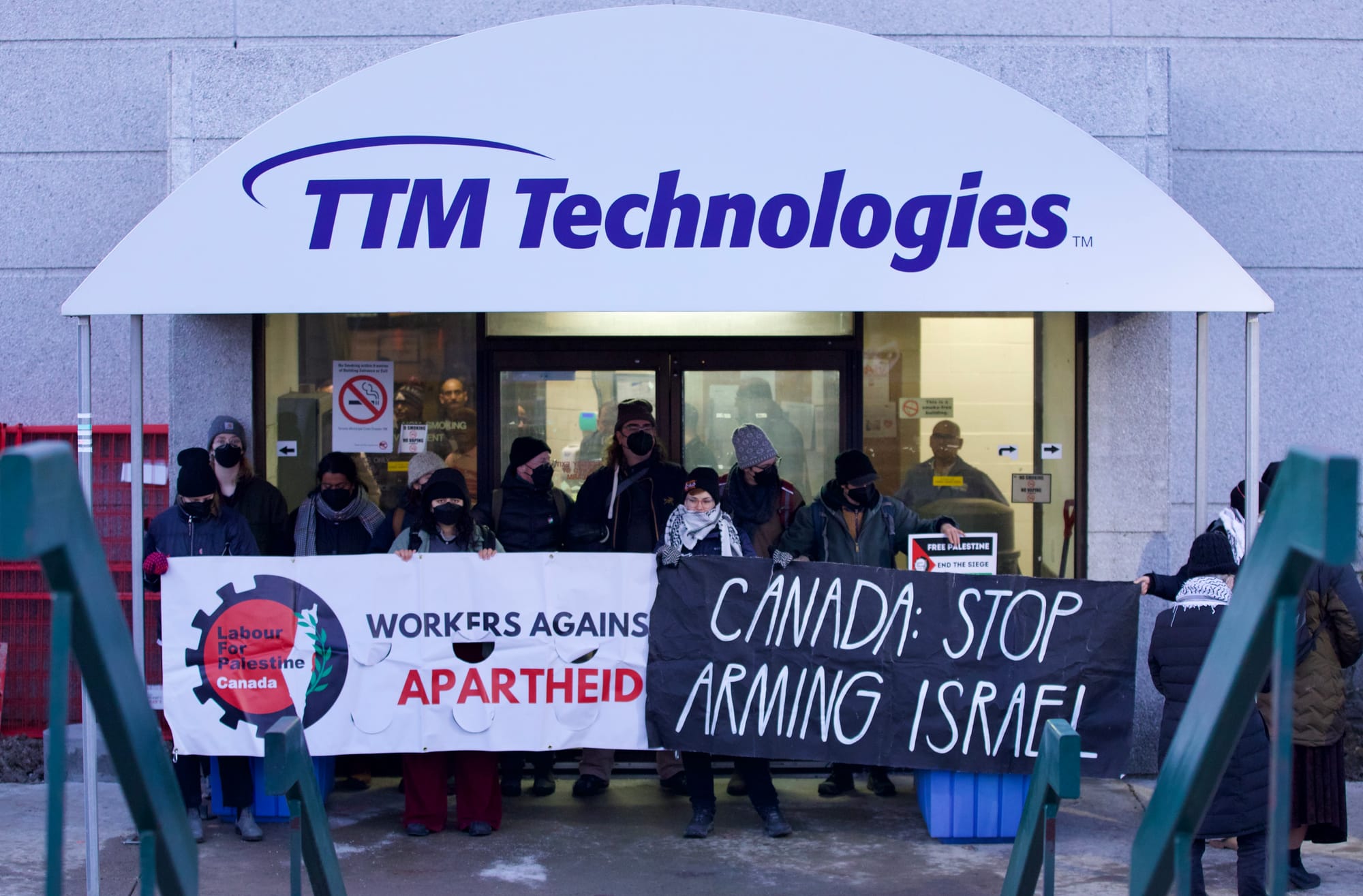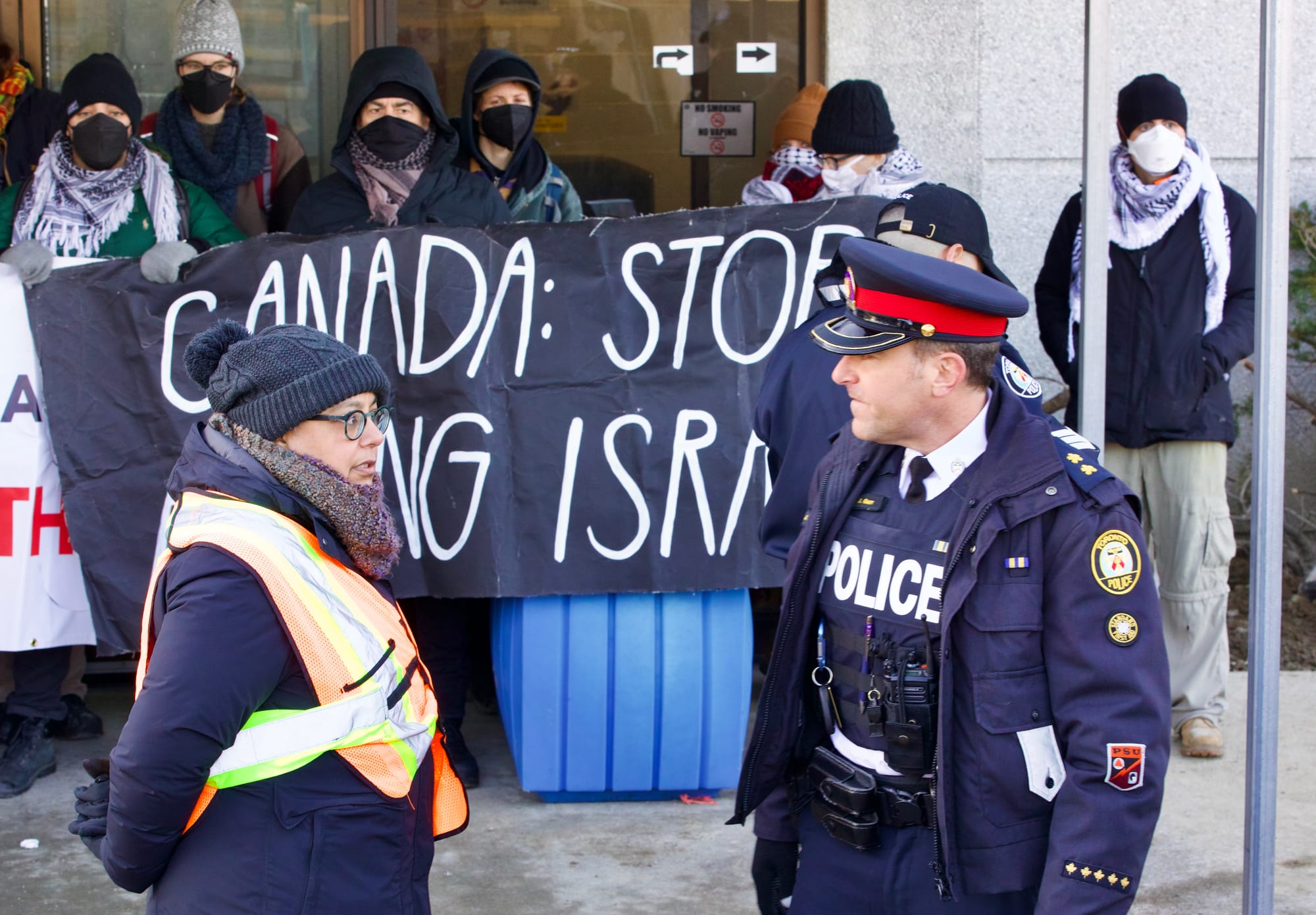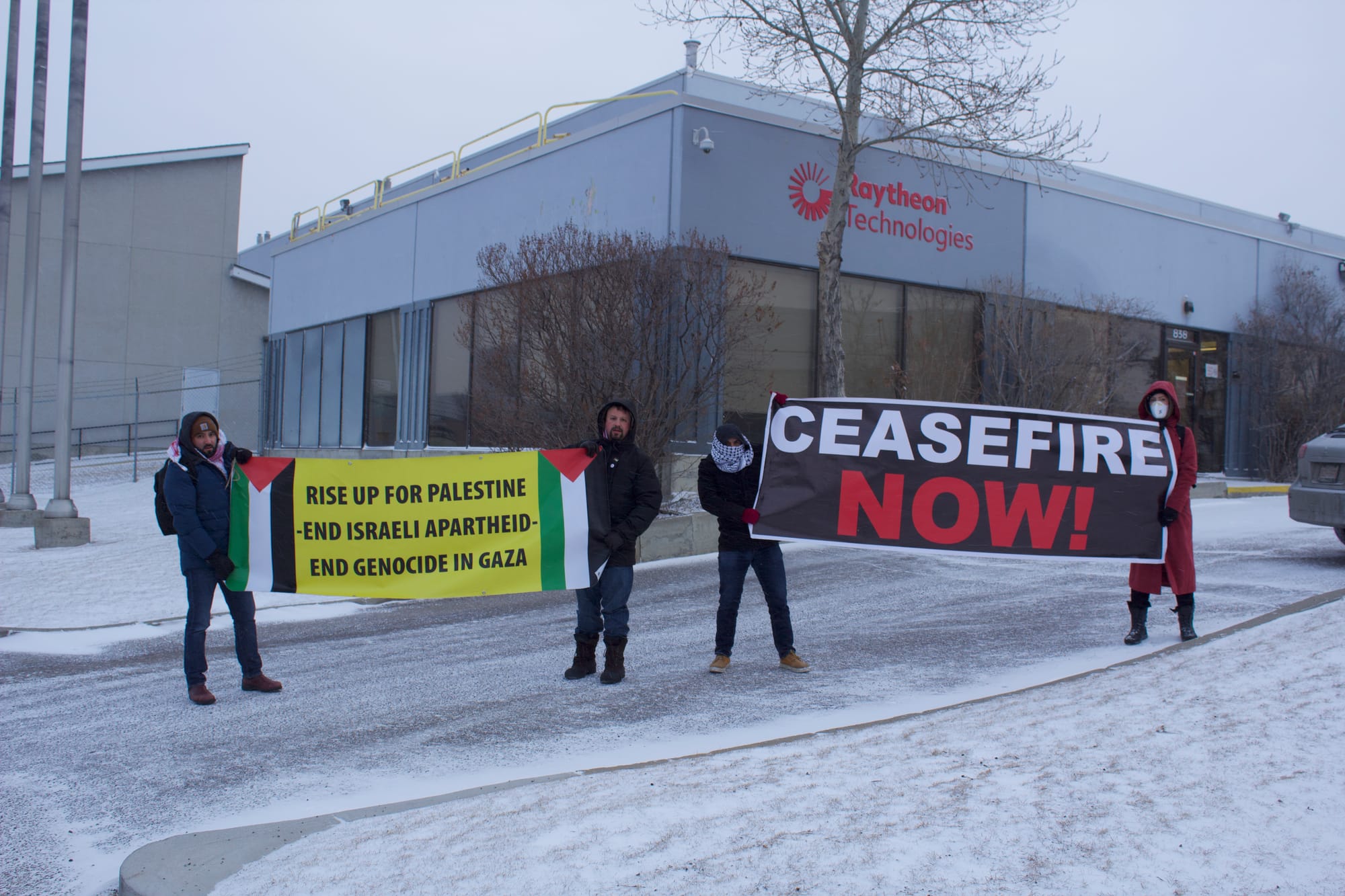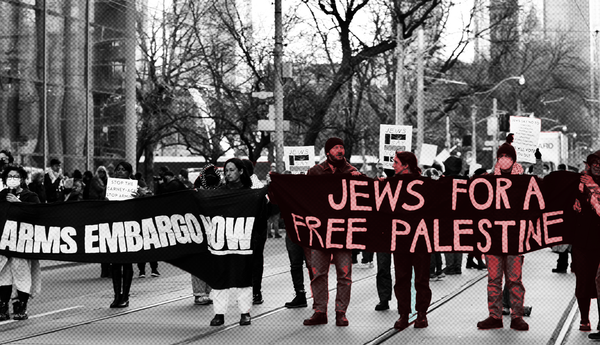Palestine solidarity activists across Canada co-ordinated blockades at the offices of several arms manufacturers this week and renewed calls for an immediate embargo on all military exports to Israel.
The Maple was on the ground in Toronto and Calgary at the protest actions that took place in those cities. Other blockades also took place in Vancouver, Quebec City, Peterborough, Kitchener-Waterloo, and Victoria this week.
More than 200 workers, union members and other activists from across the Greater Toronto Area set up picket lines and blocked the morning shift of the TTM Technologies facility on Monday morning.
The action included activists from World Beyond War Canada (WBW), Labour for Palestine (LFP), Jews Say No To Genocide, Palestinian Youth Movement (PYM), and trade unions.
Two entrances and the main door of the TTM facility were blocked, with protesters holding up banners reading “Stop Arming Genocide,” “Workers Against War,” “TTM Arms Israeli War Crimes,” and “Arms Embargo on Israel Now.”

“It is a very clear message to Prime Minister Justin Trudeau and the Liberal government that if you are not going to impose the arms embargo, then we will impose an arms embargo down on the ground, and we will be shutting down factories until the government actually listens to our demand and complies with Canadian export law,” Simon Black, an organizer with Labour Against the Arms Trade, told The Maple.
“Canada should not export any arms to a country that stands accused of genocide or where there’s a substantive risk of complicity in war crimes or international crimes against humanity.”
Since October 7, Israel’s war on Gaza has killed approximately 30,000 people – mostly women and children – displaced 85 per cent of the population and plunged the region into a humanitarian catastrophe.
Israel is now poised to launch a ground invasion on Rafah, where approximately 1.4 million civilians are trapped and taking refuge, with many having already fled other parts of the besieged enclave that were flattened by Israel’s massive bombing campaign.
In January, the International Court of Justice (ICJ), found that South Africa’s case accusing Israel of committing a genocide in Gaza was “plausible,” and provisionally ordered that Israel take steps to prevent acts of genocide, including by allowing sufficient humanitarian aid to enter Gaza. Human Rights Watch and Amnesty International both said this week that Israel has failed to comply with the ICJ’s orders.
Last week, UN experts warned that “any transfer of weapons or ammunition to Israel that would be used in Gaza is likely to violate international humanitarian law and must cease immediately.” The experts added that this includes any parts of weapons and export licenses.
In its press release, the international body directly named Canada as one of several countries that continue to export military goods to Israel.
“State officials involved in arms exports may be individually criminally liable for aiding and abetting any war crimes, crimes against humanity or acts of genocide,” the UN experts said.
“Arms companies contributing to the production and transfer of arms to Israel and businesses investing in those companies bear their own responsibility to respect human rights, international humanitarian law and international criminal law.”
Earlier this month, Nicaragua warned Canada and three other countries of its intention to take them to the ICJ for continuing to allow the export of military goods to Israel, which Nicaragua said contributed to Israel’s violations of the 1948 Genocide Convention in Gaza.
Why TTM?
On its website, World Beyond War cites partly redacted documents obtained by the Standing Committee on Foreign Affairs and International Development (FAAE) in a 2020-2021 study on military exports to Turkey.
Those documents included information that showed that TTM has, per WBW, “exported circuit boards from their Canadian location destined for consignees Elbit Systems & Artem Technologies Ltd, two Israeli companies.”
The cited documents show that Viasystems Toronto Inc., which TTM acquired in 2015, applied for permits in February and March of 2018 to ship goods to Israel under an export category that includes “Bombs, torpedoes, rockets, missiles, other explosive devices and charges and related equipment and accessories [...] and specially designed components.”
A partly redacted “goods description” section in one of the applications requested permission to “export bare printed Circuit Boards that will subsequently be populated by the consignee outside Canada” before being installed in testing equipment for a “Smart Tactical Advanced Rocket” system.
Other goods listed in the company’s various applications were described as being intended to be integrated into radio communication systems for use by ground forces, and into the display systems of Israel’s F-15 fighter jets and the “communication computer” of its F-16 fighter jets.
Israel has used both types of American-made fighter jet to conduct airstrikes on Gaza since October 7.
Another application submitted in 2018 by Viasystems requested a permit to export circuit boards intended to be integrated into the “‘Lizard’ guided kit,” a reference to an aircraft weapon system developed by Elbit. The Israeli company claims the “Lizard” kit converts “general purpose bombs to precision strike munitions with advanced targeting acquisition and engagement.”
In March 2018, Viasystems also requested permission to export circuit boards to Israel that would later be integrated into an “Unmanned Turret System” that in turn would be installed on an unspecified type of military vehicle.
In the first two months of Israel’s latest war on Gaza, the Trudeau government authorized new military export permits worth at least $28.5 million for sales to Israel. The specific nature of those goods was not disclosed by Global Affairs Canada (GAC), but the ministry has repeatedly claimed that all new military export permits to Israel have been for “non-lethal” goods.
However, that term has been panned by arms control advocates as it has no legal definition, and could refer to items like electronic components that could be integrated into deadly military hardware.
The newly authorized permits also come against a backdrop of potentially hundreds of other active export permits that were authorized and still valid before and after October 7. The nature of the goods covered under those permits is unknown.
Slowing Down Production
The demonstrators at the TTM facility said they aimed to slow down the production of any goods that might be destined for Israel.
“We want to stop, as much as possible, the manufacturing and the delivery of any parts that are used in Israeli arms,” Pamela Arancibia, a coordinator of Labour for Palestine, told The Maple.
Dozens of vehicles could not cross the picket lines and turned away from the entrances of the facility, along with other employees who arrived on foot.
“A lot of folks are asking questions about what we are doing here and why we are preventing them from going to work, and we are explaining to them that their workplace is currently producing circuit boards that are being used in [...] fighter jets,” Arancibia said.
“It is not the workers who are the enemy here; it is their bosses who are complicit in genocide, and we make that very clear to the workers,” said Black.
Police officers arrived on scene and threatened the protesters with arrest if they did not leave certain areas within five minutes. Despite the presence of more than 10 police cars, the protesters continued to demonstrate outside other parts of the facility.

“We have an obligation as trade unionists internationally to support workers in Palestine and the people of Palestine,” Liisa Schofield, a union organizer and member of Labour for Palestine, told The Maple.
“We were called upon by the Palestinian workers, by Palestinian trade unions, saying do all you can to stop the arming of Israel. It’s an urgent situation. Palestinian lives hang in the balance. And so we’re here to answer that call.”
Schofield was referring to a callout signed by 32 Palestinian labour unions and worker organizations in October that urged workers across the world to halt the export of arms and military equipment to Israel.
Dalia Awwad, a member of the Palestinian Youth Movement, told The Maple that “Canada is part of the war machine that is being deployed against the Palestinian people.”
“The less countries that support Israel, the more difficult this genocide is for them to commit,” she added.
Awwad said that exporting components of weapons is no better than sending entire weapons systems, and that Canadian politicians must end all military exports immediately.
“While Canadian politicians may like to peddle the narrative that they have no part in this, there are many weapons companies in our backyards and we are here setting up this picket in one of those companies in our backyard,” Awwad added.
Action In Calgary
A small group of protesters in Calgary gathered at the local office of American weapons manufacturer RTX, formerly known as Raytheon, early on Monday morning.
RTX develops and sells a range of military goods to Israel, including missiles used in F-16 and F-35 fighter jets.
The protesters gathered at the main gate of the Calgary office, tying it shut and attaching a banner that read “Canada Stop Arming Israel.”
Wesam Khaled, one of the organizers of the action, told The Maple that activists gathered at the facility to send the message, “we’re not going to allow business as usual.”

“I think there are a lot of people who are just average citizens in Canada and Calgary who don’t even realize that these weapons companies operate here,” said Khaled. “It’s raising awareness to them and also showing how you should deal with these companies, which is that they shouldn’t be welcome to operate here.”
“They make their money off of death and destruction, and especially now in the middle of this genocide.”
Khaled added that he hoped the action would also send a message to RTX employees, encouraging them to consider seeking out more ethical lines of work.
“The last target is also the politicians of this country, which authorize these weapons sales,” said Khaled. “They need to know that we’re not going to allow it, and we’re going to come out and do whatever it takes to prevent that.”
According to World Beyond War, similar protest actions took place this week in Vancouver, where protesters blockaded the offices of Hikvision, and in Quebec City, where protesters gathered outside the offices of Thales.
A WBW press release published on Wednesday morning also said that other protests took place at the Colt Canada facility in Kitchener-Waterloo and the Lockheed Martin facility in Victoria.
Editor's note, Feb. 29, 2024: A previous version of this story misspelled the name of Liisa Schofield. She is Liisa, not “Lisa.” The Maple regrets this error.
Nur Dogan is a Turkish-Canadian freelance journalist and photojournalist who covers stories for New Canadian Media.
Alex Cosh is the news editor of The Maple.








